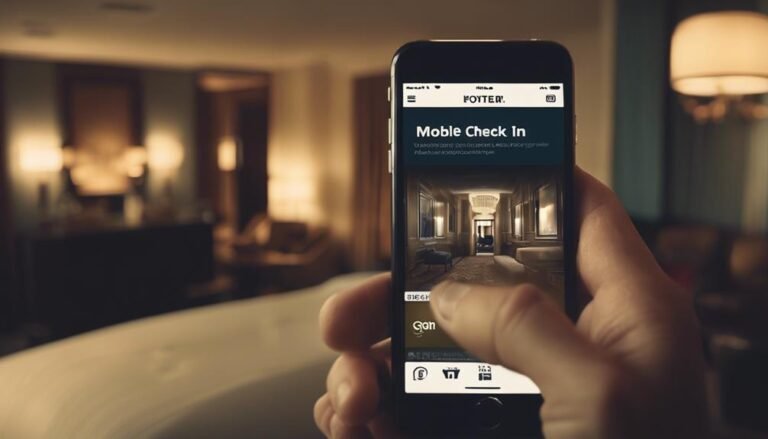Embracing Data-Driven Marketing in Hospitality
Embracing data-driven marketing in the hospitality industry involves harnessing insightful information to enhance customer interactions and drive business growth.
By leveraging data analytics, you can uncover valuable trends and patterns that can revolutionize your marketing strategies. Imagine being able to predict your guests' preferences before they even make a booking, leading to tailored experiences that exceed their expectations.
This level of personalization not only fosters guest loyalty but also boosts revenue streams.
Stay tuned to discover how data-driven marketing can transform your hospitality business into a customer-centric powerhouse.
Key Takeaways
- Utilize data insights to understand customer preferences and tailor marketing efforts effectively.
- Implement targeted marketing strategies like location-based offers and seasonal promotions.
- Enhance customer experience through personalized interactions and tailored recommendations.
- Optimize revenue with competitive analysis, dynamic pricing, and data-driven decision-making.
Importance of Data-Driven Marketing
Understanding the significance of data-driven marketing is crucial for maximizing the effectiveness of your hospitality business strategies. Data optimization allows you to extract valuable insights from the vast amount of information available to you. By analyzing this data, you can better understand your customers' preferences, behaviors, and needs. This knowledge enables you to tailor your marketing efforts to target specific customer segments effectively.
Marketing automation plays a key role in data-driven marketing by streamlining processes and personalizing interactions with customers. Through automation, you can deliver targeted messages at the right time, increasing engagement and conversion rates. Additionally, automation helps you track and measure the performance of your marketing campaigns, allowing you to make data-driven decisions to optimize future strategies.
Customer Segmentation and Targeting
When it comes to customer segmentation and targeting, you need to focus on demographic targeting strategies and behavioral segmentation techniques.
By honing in on these methods, you can tailor your marketing efforts to specific groups within your customer base, enhancing personalization and relevance.
This strategic approach allows you to maximize the impact of your marketing initiatives and drive better results in the competitive hospitality industry.
Demographic Targeting Strategies
Utilize data-driven customer segmentation to tailor targeted marketing strategies in the hospitality industry for optimal engagement and conversion rates. Demographic targeting allows you to reach specific groups effectively. Consider these strategies:
- Location-Based Targeting: Geo-targeting helps deliver personalized offers based on where customers are.
- Seasonal Promotions: Adjust marketing efforts to align with seasonal trends and capitalize on peak travel times.
- Customized Offers: Tailor promotions to match the preferences and behaviors of different demographic segments.
- Targeted Advertisements: Use demographic data to create ads that resonate with specific customer groups.
- Segmented Email Campaigns: Send personalized emails to different demographics for higher open and conversion rates.
Behavioral Segmentation Techniques
To optimize marketing strategies in the hospitality industry, leveraging behavioral segmentation techniques is crucial for tailoring personalized experiences and maximizing customer engagement. Understanding purchase behavior is key to segmenting customers effectively. By analyzing how customers interact with your brand, you can tailor your marketing efforts to cater to their specific needs and preferences.
Additionally, geographical segmentation allows you to target customers based on their location, enabling you to create location-specific campaigns and offers. By combining purchase behavior and geographical segmentation, you can create targeted marketing campaigns that resonate with your customers on a more personal level. This strategic approach not only increases customer satisfaction but also boosts loyalty and drives revenue growth in the competitive hospitality industry.
Personalization in Marketing Campaigns
Incorporating personalized touches into your marketing campaigns can significantly enhance customer engagement and drive conversions in the competitive landscape of the hospitality industry. Personalization trends are evolving rapidly, and leveraging data-driven personalization techniques is crucial to meeting guest expectations and ensuring high levels of guest satisfaction.
Key Points:
- Segmentation: Divide your audience into smaller segments based on preferences.
- Personalized Recommendations: Offer tailored suggestions based on past behavior.
- Dynamic Content: Customize content to suit individual preferences.
- Triggered Emails: Send automated emails based on specific actions or behaviors.
- Loyalty Rewards: Provide personalized incentives to loyal customers.
Utilizing Predictive Analytics for Insights
Moving beyond personalization strategies, harnessing the power of predictive analytics can unearth valuable insights into guest behaviors and preferences in the dynamic landscape of hospitality marketing. By utilizing predictive modeling applications and conducting in-depth customer behavior analysis, you can forecast trends and optimize revenue with precision.
| Benefits of Predictive Analytics in Hospitality | Description | Impact |
|---|---|---|
| Enhanced Customer Segmentation | Dive deep into customer data to create highly targeted marketing campaigns. | Increased conversion rates and customer loyalty. |
| Demand Forecasting | Predict future demand patterns to adjust pricing and inventory accordingly. | Maximizing revenue and minimizing operational costs. |
| Personalized Recommendations | Suggest tailored services based on individual preferences and past interactions. | Improved customer satisfaction and repeat business. |
| Dynamic Pricing Strategies | Adjust pricing in real-time based on demand and market conditions. | Maximizing profitability and staying competitive. |
| Risk Assessment | Identify potential risks and opportunities to proactively manage challenges. | Minimizing losses and capitalizing on emerging trends. |
Enhancing Customer Experience Through Data
Harnessing customer data analytics is pivotal in elevating the overall guest experience within the realm of hospitality marketing, driving tailored interactions and fostering lasting connections.
By utilizing data-driven customization, you can enhance customer loyalty through personalized recommendations and service improvements. Here's how you can leverage customer data to optimize the guest experience:
- Personalized Recommendations: Analyzing customer preferences and behaviors allows you to offer tailored recommendations, increasing the likelihood of upselling and enhancing overall satisfaction.
- Service Improvements: Data insights enable you to identify areas for enhancement in service delivery, ensuring a seamless and personalized experience for every guest.
- Data-Driven Customization: Tailoring services based on customer data leads to a more personalized and memorable stay, fostering loyalty and positive reviews.
- Customer Loyalty: Building loyalty through personalized experiences increases repeat visits and encourages word-of-mouth referrals.
- Enhanced Guest Satisfaction: By leveraging data to understand guest needs, you can proactively address issues and exceed expectations, resulting in higher satisfaction levels.
Implementing Dynamic Pricing Strategies
When implementing dynamic pricing strategies in the hospitality sector, it's crucial to focus on pricing optimization techniques to maximize revenue.
By making demand-based rate adjustments, you can adapt to fluctuations in the market and capitalize on peak periods.
Conducting competitive market analysis will also provide insights into pricing trends and help you stay ahead of the competition.
Pricing Optimization Techniques
To enhance revenue generation and stay competitive in the hospitality industry, consider implementing dynamic pricing strategies for optimal pricing optimization. Dynamic pricing involves adjusting prices in real-time based on various factors such as demand, competitor pricing, and market conditions. By utilizing dynamic pricing techniques, you can maximize revenue potential and cater to different customer segments effectively.
Here are some pricing optimization techniques to consider:
- Utilize Competitive Benchmarking: Analyze competitors' pricing strategies to ensure your prices remain competitive.
- Implement Revenue Optimization Strategies: Focus on maximizing revenue through strategic pricing adjustments.
- Leverage Dynamic Pricing: Adjust prices dynamically based on demand fluctuations.
- Utilize Demand Forecasting: Predict future demand patterns to optimize pricing strategies.
- Analyze Market Conditions: Consider external factors such as events or holidays to adjust pricing accordingly.
Demand-Based Rate Adjustments
Implementing dynamic pricing strategies through demand-based rate adjustments can significantly impact revenue optimization in the hospitality industry by responding to market fluctuations effectively. By analyzing real-time data on factors like seasonality, local events, and booking trends, hotels can adjust their rates to capitalize on periods of high demand and optimize revenue.
This proactive approach to rate optimization enables hoteliers to maximize profitability by setting prices that reflect the value guests are willing to pay. Leveraging revenue management systems that incorporate demand forecasting and competitor pricing analysis is essential for success in today's competitive market.
Embracing dynamic pricing strategies not only enhances revenue management but also fosters a more strategic and data-driven approach to pricing decisions in the hospitality sector.
Competitive Market Analysis
Maximizing revenue in the hospitality industry requires a strategic analysis of competitive market dynamics to effectively implement dynamic pricing strategies. To excel in this area, consider the following key points:
- Market Share Analysis: Evaluate your current market share and identify opportunities for growth.
- Competitive Benchmarking: Analyze competitors' pricing strategies and adjust your own accordingly.
- Revenue Management Tools: Utilize advanced tools to track market trends and optimize pricing in real-time.
- Customer Segmentation: Segment your customer base to tailor pricing strategies to different market segments.
- Continuous Monitoring: Regularly monitor market changes and adjust pricing strategies to stay competitive.
Leveraging Social Media Analytics
Leveraging social media analytics enables hospitality businesses to gain valuable insights into customer preferences and behaviors, driving targeted marketing strategies for enhanced engagement and loyalty. By analyzing social media engagement metrics such as likes, shares, comments, and mentions, you can understand what content resonates with your audience and tailor your marketing efforts accordingly. Additionally, tracking brand sentiment on social media platforms allows you to monitor how customers perceive your brand, identify areas for improvement, and address any negative feedback promptly.
With the help of social media analytics tools, you can track key performance indicators (KPIs) such as reach, engagement rate, and conversion rate to measure the effectiveness of your social media campaigns. These insights enable you to optimize your marketing strategies, allocate resources more efficiently, and ultimately drive better results. By leveraging social media analytics effectively, you can stay ahead of trends, identify opportunities for growth, and build stronger relationships with your customers in the competitive hospitality industry.
Measuring Marketing ROI Effectively
To measure marketing ROI effectively, focus on aligning your campaign objectives with quantifiable metrics that directly tie back to your business goals. Implementing attribution modeling and robust campaign tracking mechanisms can significantly enhance your ability to gauge the impact of your marketing efforts.
When striving for improved marketing performance and data integration, consider the following strategic approaches:
- Utilize Multi-Touch Attribution: Understand the contribution of each touchpoint in the customer journey to accurately attribute conversions.
- Implement Marketing Automation: Streamline processes and track interactions to measure the effectiveness of your campaigns more efficiently.
- Leverage Customer Lifetime Value: Assess the long-term impact of your marketing initiatives on customer retention and revenue generation.
- Analyze Cross-Channel Engagement: Monitor how customers interact with your brand across different channels to optimize your marketing mix.
- Invest in Data Visualization Tools: Transform complex data sets into actionable insights for better decision-making.
Case Studies of Successful Data-Driven Campaigns
Aligning your campaign objectives with quantifiable metrics and implementing data-driven strategies has paved the way for numerous successful data-driven campaigns in the hospitality industry. Let's delve into two key areas where data has been utilized effectively: data-driven loyalty programs and conversion rate optimization.
Data-driven loyalty programs have been a game-changer for many hospitality businesses. By analyzing customer behavior and preferences, hotels have been able to tailor personalized offers, rewards, and experiences. For example, a hotel chain used data analytics to identify frequent guests and their preferences, resulting in targeted loyalty rewards that significantly increased customer retention and satisfaction rates.
Conversion rate optimization is another critical aspect where data-driven campaigns have excelled. Through A/B testing, analyzing website traffic patterns, and customer feedback, hotels have been able to enhance their booking processes, leading to higher conversion rates. A case study highlighted a hotel that revamped its online booking system based on data insights, resulting in a 20% increase in direct bookings within a few months.
Conclusion
As you've delved into the realm of data-driven marketing in the hospitality industry, you've uncovered the power of utilizing customer insights to drive strategic decisions.
By embracing predictive analytics, personalization, and dynamic pricing strategies, you have the tools to enhance customer experience and boost marketing ROI.
Through the success stories of data-driven campaigns, you've witnessed firsthand the transformative impact of leveraging data to create innovative and strategic marketing initiatives.
Dive deeper into the data, and unlock endless possibilities for growth in the hospitality sector.







